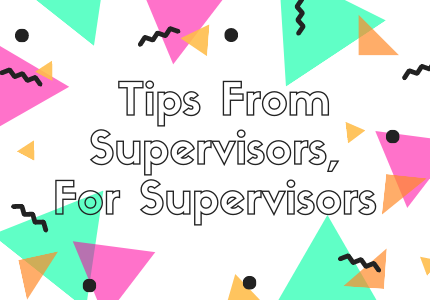Tips From Supervisors, For Supervisors

Each Supervisor has their own preferred ways of coaching, and finding their personal methods will be a process during your first few months as a Supervisor. We asked our supervisors here at Expivia to write down 5 tools they use to make their jobs a little easier. Whether the topic is Work From Home, Coaching, or Monitoring, here are some tips from various Supervisors that will help you find your own style, foster a supportive culture, and help you and your agents succeed.
Use the QA Form as a Tool and Be Transparent.
In regards to coaching, what can be the most beneficial tool is being completely transparent with your reps. Coaching is primarily based on call performance and daily monitoring, while the Evaluations are to be used as a tool. Allow reps to view the Evaluation list, learn the key points each rep must hit on a call, and understand the whole process. When it’s time to coach the rep, listen to the call or area of concern, and then have them do a mock evaluation on themselves. This allows you to see what coaching approach you should take. You get to know if the rep is even aware that there’s an issue (let’s be honest, who pays 100% attention during training?) Nobody knows the product/service better than the clients themselves. They give you direction on the Product/Service by providing the evaluation tool. Transparency is the key!
Train as a Supervisor, not as a Rep
There may be a time where you’re learning a program right beside the reps and everything is fresh. You need to know not only what can go wrong, but how to prevent issues from happening in the first place. Depending on the program, ask if there have been areas of concern you should keep your eye out for, or if there are any error reports that can be established. Realize you need training beyond what you receive along with your team. Write down questions during training and pass those questions directly along to Management. See if it is possible to get the pertinent info you’ll need as a supervisor from the very beginning, so you’re completely aware of what to look out for.
Be Present
It’s important to interact with your reps and let them know you’re always approachable. Especially now, your reps may all be remote where you can not physically observe what they are doing so it’s important to be present. Engage your reps during downtime, do your best to keep them focused on their monitor, whether it’s playing a game or having a conversation.
There is No “I” in Team
It’s imperative to empower your reps with feeling confident in their program, and the best way to do this is to encourage teamwork. Always encourage your team to assist each other. Let them know you aren’t this omniscient being and that you also have to ask questions. It’s okay for your team to ask questions and be comfortable in doing so.
Coaching is Great, But Educating is Better
When you educate the rep, you not only mention an area that needs improvement but explain WHY. Often when a rep becomes familiar with their program, they may lean more towards a call handling process that they are comfortable with, compared to how the Client wants the call handling process to occur. It is important to differentiate when to coach and when to educate.
Have Structure to Your Daily Activities
Structure helps build good habits and routines which lead to making the job easier.
Write Clearly
When doing evaluations, write clearly, provide detail, and make sure the areas that need coaching are clearly highlighted in the comments. That way if another supervisor needs to help with coaching, they can do so without issue.
Include Positive Feedback When Evaluating
When you coach a rep on one of their calls, be sure to always include any positive points about the call. Featuring only the negatives can make the rep feel like they are not doing anything right. Everyone responds to feedback differently.
Make Checklists
Make a little checklist of the points they need to hit on each call to help keep things on track. That way if you are interrupted during a call by a rep or another supervisor, you do not need to go back and listen to the call from the start again.
Use Synopsis Templates
When writing your synopsis, utilizing a template greatly reduces the time it takes to write it. Utilize features like “bold” and “underline” to help make the format look and read better.
Learn Your Reps
Everyone learns and thinks differently. Getting to know your reps personally is a great way to build trust and respect. Reps will be more likely and willing to learn from their mistakes if they are hearing this feedback from someone they trust. Approach people kindly, we are all human.
Understand Your Call Center Dashboard.
Make sure you become an expert you are looking at when it comes to the real time dashboards and your expected KPIS’s
Build Your Reps Up.
Acknowledge their strengths MORE than you stress their weaknesses. This will make them feel appreciated instead of beat up or singled out. When people feel appreciated, they work harder. So it will always build morale to showcase their accomplishments, even the small ones. Give them a compliment, tell them the issue that needs corrected, and provide examples of how they could do it better in the future. Tell them about a time you made an error similar and how you grew from the coaching you received.
Communicate with Upper Management.
This can help to prevent issues and misunderstandings. Just like you cannot help your reps when you do not know they have an issue, they cannot help us if they do not know.
Coaching Styles
Get to know everyone on a different level. In situations, people handle things differently and you have to know how to motivate each individual.
Treating People the Way You Want To be Treated
Being a supervisor does not mean that you can mistreat people and they are supposed to accept it. We are all adults and should be treated as so.
Behavior
The way you interact with your team and others rub off on everyone. As a supervisor in the worst situations, you have to stay positive.
Leading by Example
Show up and be on time. Show that you are working as hard as the reps and are to be able to fulfill program needs.
Support The Reps While They Do Their Job.
If they need assistance or have any questions just responding fast or showing them you are willing to help can build their trust in you.
Be Knowledgeable
Being able to answer all questions and understand all situations that may occur while working can help the reps build confidence and be able to gain more knowledge as well.
Communication
When doing one on ones, go over previous calls and provide positive feedback for areas they are strong in. Provide tips where they can improve to retain a higher score for the graded call.
Be Relatable
Some days are better than others for most people and some reps might not be having a good day. Asking them and being on a peer-level can help them build a better attitude
Bonus Tidbits
Know your people. When doing your one on one, 1st relate to the rep on a personal level then talk program.
Make your reps feel that they are a valuable part of the team.
Do not play favorites. Always stand behind policy and enforce it across the board.
Always remember no one wants to fail. Work with each rep to build them up.
Be a good example. Encourage reps to be a leader. Treat the reps with respect and be kind.
Be reliable, consistent, and available. Let your reps know they can always reach out and depend on you.
You do not have to be friends with everyone, but you do have to be kind and respectful.
Keep work and home separate!




